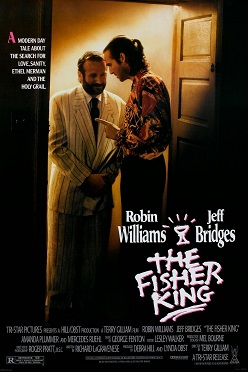← Back to Reviews
in
THE FISHER KING

For those who like movies that are rich with colorful and eccentric characters, touches of comic and dramatic fantasy, and arresting visual images all wrapped inside a moving and vividly human story, you don't have to look any further than 1991's The Fisher King, a moving story about the power of guilt and redemption.

Jeff Bridges turns in a delightfully unhinged performance as Jack Lucas, a radio "shock jock" whose abuse of a fan on the air inadvertently led to a terrible tragedy. Three years later, Jack has quit the radio, is despondent, drinking heavily, and is working in a video store and sleeping with the owner (Mercedes Ruehl). He meets a deranged homeless man named Perry (Robin Williams) who gets Jack out of a serious scrape before Jack learns that Perry was severely affected by the aforementioned tragedy three years before.
Jack decides he might be able to find redemption for his part in the tragedy if he can help this man. The man initially won't take the $70 that Jack offers him so Jack decides to help Perry meet a woman (Amanda Plummer) who he's been stalking all over Manhattan for two years because he claims he's in love with her.

Screenwriter Richard LaGravanese (who also makes a cameo in the film as a mental patient) has given us a complex story all based around the questionable moral compass of Jack Lucas...this guy does a lot of right things for the wrong reasons, but really has no idea that his reasoning his skewed, which makes it hard to fault what he tries to do but it doesn't excuse it and you can see the motivation behind every move he makes with Perry from a mile away. I love that Jack actually thinks he can erase his guilt with $70. The predictability of Jack's actions is in direct conflict with his intentions, whether it's with Perry or with his video store owner girlfriend, who clearly literally scooped Jack up from the gutter and saved him from complete self-destruction and his gratitude appears to be love in her eyes, though it's evident from their first moments onscreen together that Jack doesn't love this woman.

Director Terry Gilliam employs some imaginative camera work and expects the audience to accept a lot. It's never really directly addressed, but I think there are deeper mental health issues with Perry than the tragedy three years ago but a scene inserted in the final act seems to make us want to believe that this is all it is.

Gilliam also manages some strong character reveal through the performances he got from this terrific cast. Bridges owns the flawed and fascinating Jack and Robin Williams' Oscar nominated performance might seem a bit over the top to some, but there wasn't one thing the late actor did in this performance that I didn't buy or wasn't moved by. Ruehl won the Oscar for Best Supporting Actress for her raw and gutsy turn as Jack's girlfriend who has on rose colored glasses regarding her relationship with Jack and Amanda Plummer is delightfully loopy as the object of Perry's affections. The happy ending seems to fall into place a little too quickly, but most of this film is a slightly uncomfortable but very fulfilling journey.

For those who like movies that are rich with colorful and eccentric characters, touches of comic and dramatic fantasy, and arresting visual images all wrapped inside a moving and vividly human story, you don't have to look any further than 1991's The Fisher King, a moving story about the power of guilt and redemption.

Jeff Bridges turns in a delightfully unhinged performance as Jack Lucas, a radio "shock jock" whose abuse of a fan on the air inadvertently led to a terrible tragedy. Three years later, Jack has quit the radio, is despondent, drinking heavily, and is working in a video store and sleeping with the owner (Mercedes Ruehl). He meets a deranged homeless man named Perry (Robin Williams) who gets Jack out of a serious scrape before Jack learns that Perry was severely affected by the aforementioned tragedy three years before.
Jack decides he might be able to find redemption for his part in the tragedy if he can help this man. The man initially won't take the $70 that Jack offers him so Jack decides to help Perry meet a woman (Amanda Plummer) who he's been stalking all over Manhattan for two years because he claims he's in love with her.

Screenwriter Richard LaGravanese (who also makes a cameo in the film as a mental patient) has given us a complex story all based around the questionable moral compass of Jack Lucas...this guy does a lot of right things for the wrong reasons, but really has no idea that his reasoning his skewed, which makes it hard to fault what he tries to do but it doesn't excuse it and you can see the motivation behind every move he makes with Perry from a mile away. I love that Jack actually thinks he can erase his guilt with $70. The predictability of Jack's actions is in direct conflict with his intentions, whether it's with Perry or with his video store owner girlfriend, who clearly literally scooped Jack up from the gutter and saved him from complete self-destruction and his gratitude appears to be love in her eyes, though it's evident from their first moments onscreen together that Jack doesn't love this woman.

Director Terry Gilliam employs some imaginative camera work and expects the audience to accept a lot. It's never really directly addressed, but I think there are deeper mental health issues with Perry than the tragedy three years ago but a scene inserted in the final act seems to make us want to believe that this is all it is.

Gilliam also manages some strong character reveal through the performances he got from this terrific cast. Bridges owns the flawed and fascinating Jack and Robin Williams' Oscar nominated performance might seem a bit over the top to some, but there wasn't one thing the late actor did in this performance that I didn't buy or wasn't moved by. Ruehl won the Oscar for Best Supporting Actress for her raw and gutsy turn as Jack's girlfriend who has on rose colored glasses regarding her relationship with Jack and Amanda Plummer is delightfully loopy as the object of Perry's affections. The happy ending seems to fall into place a little too quickly, but most of this film is a slightly uncomfortable but very fulfilling journey.
